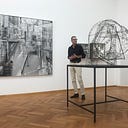Thinking out loud about past, present and future (#5) — On ‘first loves’ and curiosity

“The most fruitful and natural exercise for our minds is, in my opinion, conversation.” — Michel de Montaigne, Of The Art Of Conference
As we, Eitan Reich and Mark Storm, are planning for a transformative learning program to help senior managers and executive leaders make sense of the world, we often share our thoughts and ideas, and talk about our experiences. Now we would like to invite you to join us in our conversations. Starting with ‘Curiosity,’ the first in a series of monthly online conversations in which we will be exploring five essential tools for new ways of thinking and being: curiosity, beauty, craftsmanship, mastery and playfulness.
On ‘first loves’ and curiosity
In a recent essay (‘First Love,’ available in Dutch only), the Dutch philosopher Stine Jensen writes about first time experiences and how they appeal to all our senses. Whether literally our first love or the first time we come face to face with the Mona Lisa, these experiences are often defining moments in our lives. They kindle our curiosity, can give us a sense of purpose and may even lead us into entirely new directions.
But how often do we seek such experiences in our work? How often do we allow ourselves, and others, to leave the well-trodden path of efficiency, of what we know already, to seek new knowledge, try new things, shape new relationships?
These aren’t philosophical ‘niceties’; not anymore. In business environments which are increasingly dominated by complexity and ambiguity, leaders need to look beyond what they have learned and know. But rather than seeking to understand this complex and ambiguous world, they seek to create simpler worlds they can understand — comprehensible, manageable. In the end, they merely deceive themselves by masking reality.
But instead of suppressing this reality we need to venture into the unknown. This requires an eagerness to learn. It demands curiosity; one of the essential tools for navigating an uncertain future.
It is time we start seeking out new ‘first loves.’ Why don’t you join us?
If you want to learn more about the importance of curiosity and how to apply or foster it in your team or organisation, please join us in our ‘virtual circle for senior leaders’ — a series of candid conversations about the things that really matter.
— Only 8 seats available
— Wednesday, 30 January 2019 (via Zoom)
— 20:00–21:00 CET
— Your hosts: Eitan Reich and Mark Storm
Save your seat at conversations@newaysof.com. We hope to welcome you in person, albeit online, on the 30th.

“What I have is a malevolent curiosity. That’s what drives my need to write and what probably leads me to look at things a little askew. I do tend to take a different perspective from most people.” — David Bowie
Earlier episodes
These posts include parts of our conversations. They meander in many directions and frequently run into dead-end streets. We like to share them anyway because we believe that ‘thinking out loud’ is not only “the most fruitful and natural exercise for our minds” but in the end also leads to the most beautiful results.
